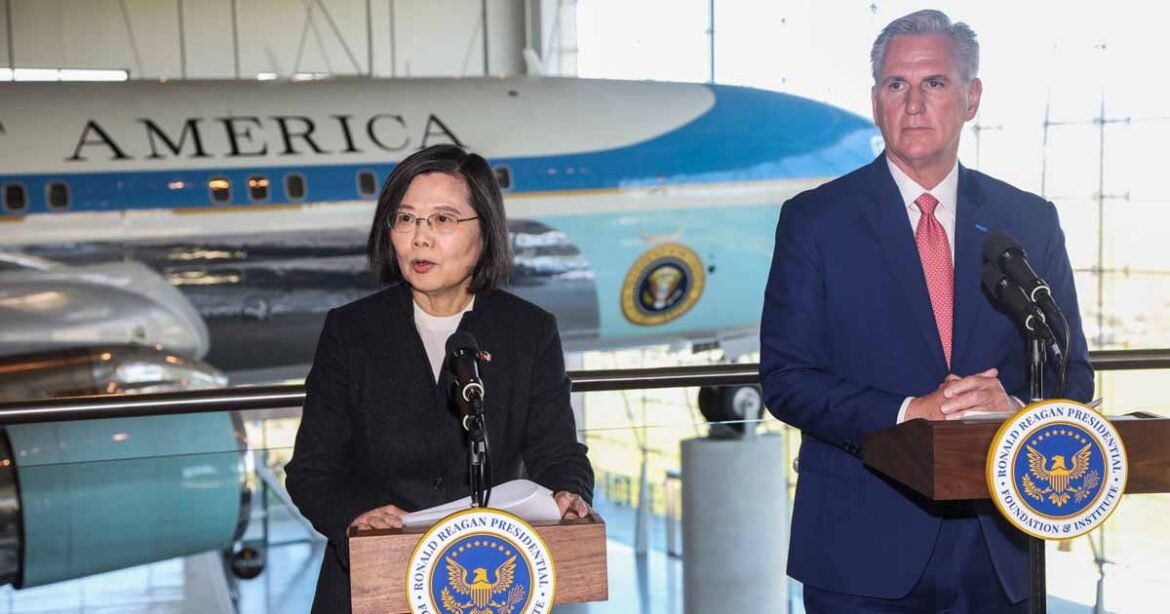The diplomatic meeting between Taiwan’s President Tsai Ing-wen and US Speaker of the House of Representatives Kevin McCarthy, which took place in March 2023, has raised eyebrows and sparked fierce criticism from China. Despite the US and Taiwan having a long-standing relationship and the latter enjoying the support of the former, China considers Taiwan as a renegade province that must be reunified with the mainland, by force if necessary.
You Can Also Read: China’s diplomatic efforts bear fruit as Saudi and Iranian FMs meet in Beijing
Against this backdrop, Tsai’s meeting with McCarthy was seen by many as a provocation by the US, which has long viewed China as a strategic rival in the Asia-Pacific region. As a result, China’s response to the meeting has been swift, angry, and potentially destabilizing, raising concerns about the future of the Taiwan-China-US relationship.
Background on Taiwan-China Relations
Taiwan has been a source of tension between China and the US for decades. China considers Taiwan a renegade province and has long sought to reunify it with the mainland, by force if necessary. The US, on the other hand, has maintained close ties with Taiwan and sells weapons to the island nation to help defend against potential Chinese aggression.
Meeting between Tsai Ing-wen and Kevin McCarthy
In March 2023, Tsai Ing-wen met with Kevin McCarthy, the US Speaker of the House of Representatives, during her visit to the United States. The meeting was seen as a significant move by the US to show its support for Taiwan, as McCarthy is one of the most senior members of the US government.
China’s Reaction
China’s reaction to the meeting was swift and furious. The Chinese Foreign Ministry spokesperson Zhao Lijian said that “The Chinese government firmly opposes any form of official exchange and military contact between the US and Taiwan,” and warned that the US should “not send any wrong signals to Taiwan independence forces.” China also summoned the US ambassador to China to protest the meeting.
China’s Anger Rooted in Nationalism and Territorial Claims
China’s anger over the meeting is rooted in its nationalist ideology and its territorial claims over Taiwan. The Chinese government views Taiwan as an inseparable part of its territory, and any move by Taiwan towards independence is seen as a threat to China’s sovereignty.
China also views Taiwan as a legacy of its past humiliation by foreign powers. Taiwan was ceded to Japan by China in the late 19th century and was later returned to China after Japan’s defeat in World War II. However, after the Chinese civil war, the Nationalist government retreated to Taiwan and established a separate government there. China sees this as a continuation of foreign interference in its internal affairs.
China’s Response to the Meeting
China’s response to the meeting between Tsai Ing-wen and Kevin McCarthy shows that it is willing to take a hardline stance on Taiwan. China has repeatedly warned the US against supporting Taiwan and has threatened to use force if necessary to reunify Taiwan with the mainland.
However, the US has shown no signs of backing down from its support for Taiwan. The meeting between Tsai Ing-wen and Kevin McCarthy is just the latest example of the US’s commitment to Taiwan’s security and independence.
To end, the meeting between Taiwan’s President Tsai Ing-wen and US Speaker of the House of Representatives Kevin McCarthy has angered China, but it is just the latest episode in a long-standing conflict over Taiwan’s status. China’s anger over the meeting is rooted in its nationalist ideology and its territorial claims over Taiwan. The US, on the other hand, has maintained close ties with Taiwan and has shown no signs of backing down from its support for the island nation. The conflict between China and Taiwan is likely to continue, and the US’s stance on Taiwan will be a key factor in shaping the future of the region.


